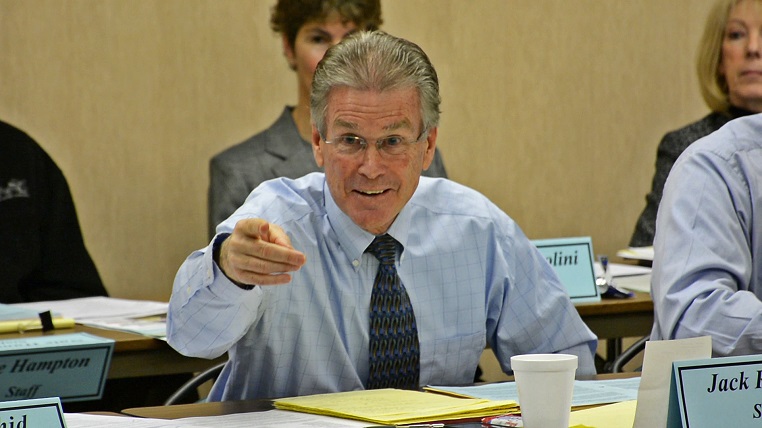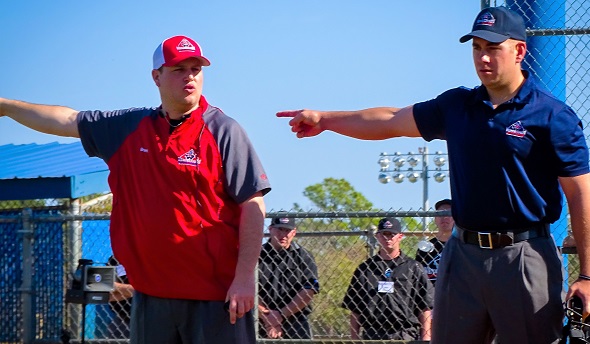
Retired MHSAA Executive Director Roberts Selected for NFHS Hall of Fame
By
Geoff Kimmerly
MHSAA.com senior editor
March 8, 2022
During an award introduction two years ago, MHSAA associate director Tom Rashid described his longtime close friend Jack Roberts as the leader who “took our darkest hours and problems and turned them into positives.”
The MHSAA has faced its share of challenging times, and those may have been among Roberts’ finest hours over 32 years as MHSAA executive director – and admittedly the times when his adrenaline flowed most. But there were many more good times and memorable advances for Michigan school sports under his leadership, and he will be recognized again this summer both for those and a lifetime of service to school sports in this state and across the nation.
John E. “Jack” Roberts was one of 12 honorees announced Tuesday as this year’s inductees into the National High School Sports Hall of Fame by the National Federation of State High School Associations (NFHS). He will be inducted as one of three former state association administrators selected for the 39th Hall of Fame class at a ceremony during the NFHS summer meeting July 1 in San Antonio, Texas.
He began his tenure as MHSAA executive director in 1986, and at the time of his retirement he was the nation’s longest-serving executive director of a state high school athletic association. He was the fourth person to serve the MHSAA in that leadership role full time, following Charles E. Forsythe (1931-42, 1945-68), Allen W. Bush (1968-78) and Vern L. Norris (1978-86).
Roberts will become the Hall of Fame’s ninth inductee from Michigan, joining Forsythe (inducted 1983), River Rouge boys basketball coach Lofton Greene (1986), Warren Regina athletic director, softball and basketball coach Diane Laffey (2000), Fennville basketball and baseball standout Richie Jordan (2001), Grosse Pointe Woods University Liggett boys and girls tennis coach Bob Wood (2005), Bloomfield Hills Cranbrook hockey standout Jim Johnson (2007), Owosso football, basketball and baseball all-stater Brad Van Pelt (2011); and Vermontville Maple Valley baseball national record holder Ken Beardslee (2016).
Roberts also follows in the footsteps of his late father, John Roberts, who served as executive director of the Wisconsin Interscholastic Athletic Association from 1957-85 and was inducted into the National High School Hall of Fame in 2000. They will be the first father-son team in the Hall of Fame.
Jack Roberts began his career serving as an assistant director for the National Federation from 1973-80. He was involved with the implementation of Title IX at the local and state levels and made immense contributions as the NFHS representative to the landmark Amateur Sports Act of 1978, and also played a significant role in the NFHS rules-writing process as the organization started writing and publishing rules for a number of new sports during the 1970s.
The MHSAA enjoyed continued growth under Roberts’ guidance, particularly in the number of Michigan students participating in athletics and in the number of MHSAA-sponsored tournament sports available to them. Several key rules changes came under Roberts’ watch and direction, and he made the MHSAA a national leader in health and safety efforts particularly in the areas of head injury care, heart safety initiatives and heat management strategies.
“I had a head start in this work. Growing up in the home of the executive director of the Wisconsin Interscholastic Athletic Association and then spending most of my 20s working for the National Federation office, and much of it with (longtime NFHS executive director) Cliff Fagan, was a jumpstart on this career,” Roberts said. “But I’m also satisfied at this point that, to paraphrase Hamilton in the musical ‘Hamilton,’ I didn’t give up on my shot. I was given a shot, I took it and I didn’t waste the chance.
“The job fit me, and I think I maxed the opportunity I had to serve educational athletics in this job, and that’s satisfying to think about at this time.”
 Under Roberts’ leadership, overall participation in high school athletics in Michigan increased 10 percent, and the MHSAA added more than 200 schools in increasing its membership by more than 15 percent at the high school and junior high/middle school levels combined. His tenure saw the addition of girls competitive cheer (1994), girls & boys bowling (2004) and girls & boys lacrosse (2005) to the MHSAA Tournament sport lineup, the creation of a separate wrestling tournament to determine champions by team format (1988), and 8-player football (2010, first playoffs 2011) as many small schools across the state began having trouble fielding 11-player teams because of enrollment and population decreases. Meanwhile, also under his leadership, the 11-player Football Playoffs expanded, doubling to 256 teams in 1999.
Under Roberts’ leadership, overall participation in high school athletics in Michigan increased 10 percent, and the MHSAA added more than 200 schools in increasing its membership by more than 15 percent at the high school and junior high/middle school levels combined. His tenure saw the addition of girls competitive cheer (1994), girls & boys bowling (2004) and girls & boys lacrosse (2005) to the MHSAA Tournament sport lineup, the creation of a separate wrestling tournament to determine champions by team format (1988), and 8-player football (2010, first playoffs 2011) as many small schools across the state began having trouble fielding 11-player teams because of enrollment and population decreases. Meanwhile, also under his leadership, the 11-player Football Playoffs expanded, doubling to 256 teams in 1999.
Among rules changes put in place during Roberts’ tenure was the addition of opportunities for multiple schools to create cooperative teams in sports where participation is lagging. He also helped Michigan become a national leader in improving sportsmanship; a comprehensive package enacted in 1996 set a statewide tone for appropriate behavior and perspective that continues to make an impact today.
Perhaps the most significant influences by Roberts came on the topics of health and safety. The MHSAA has led nationally in concussion care with its first programming in 2000 and return-to-play protocols enacted in 2010, and with mandated concussion reporting and insurance for those who suffer head injuries rolled out in 2015. A heat management policy and CPR requirements for coaches were introduced in 2013.
Also under this leadership, the first program for coaches education was launched in 1987 and evolved into the Coaches Advancement Program, with nearly 34,000 courses administered as part of CAP since 2004-05. The Women in Sports Leadership Conference was created in 1989 and remains the first, largest and longest-running program of its type in the country, regularly drawing upwards of 500 participants. The first of now-annual statewide Athletic Director In-Service Programs was conducted in 1992, and Michigan also remains a national leader in student services thanks to a variety of programs that were introduced under Roberts’ leadership.
Internally, he put the MHSAA on the leading edge nationally when it came to use the technology, especially in the realm of communications, where he put special emphasis on telling the story of school sports. “I think I was considered a conservative as to rules for eligibility and competition, and a progressive in how we delivered services to schools and school sports,” Roberts said.
In addition to his work specifically in Michigan, Roberts carried significant influence at the national level. He served as part of the NFHS Board of Directors and led the creation of the NFHS Network for video productions in 2012, serving as that board’s chairperson. He also has served on the board of directors of the National Association of Sports Officials (NASO).
“For 32 years, Jack Roberts was the epitome of what leadership looks like. He was the strongest advocate for high school sports that anyone could ever hope for,” said MHSAA Executive Director Mark Uyl, who succeeded Roberts in 2018. “He is without question one of the preeminent pioneers and difference-makers in the world of high school sports over the past 100 years.
“And other than my father, there has not been a man who has had a bigger impact and positive influence on my life personally than Jack Roberts.”
The National High School Hall of Fame was started in 1982 by the NFHS, and the rest of this year’s class is made up of athletes, coaches, administrators and an official. The 12 individuals were chosen after a two-level selection process involving a screening committee composed of active high school state association administrators, coaches and officials, and a final selection committee composed of coaches, former athletes, state association officials, media representatives and educational leaders. Nominations were made through NFHS member associations. Also chosen for this class were athletes Notah Begay (New Mexico), Walter Payton (Mississippi), Sanya Richards-Ross (Florida) and Thurman Thomas (Texas); sport coaches Ray Crowe (Indiana), Ron Kordes (Kentucky) and Lamar Rogers (Tennessee); administrators E. Wayne Cooley (Iowa) and Becky Oakes (Missouri), official Jeff Risk (North Dakota) and speech/debate coach Susan McLain (Oregon). (Click for more.)
Roberts came to the MHSAA in 1986 from the Fellowship of Christian Athletes, which he served as executive vice president. He is a 1970 graduate of Dartmouth College and taught English and coached football at high schools in Milwaukee and Denver before joining the NFHS staff.
He and his wife Peggy reside in East Lansing, and in retirement they together have increased their contributions to environmental matters and international refugee issues while both serving in leadership roles. Jack Roberts has served as board president for the Refugee Development Center in Lansing for 13 years, and Peggy Roberts served six years as chairperson of the board for Lansing’s Fenner Nature Center. As part of their environmental work, the Roberts are working within a small group of organizations to help them acquire and preserve land.

Rice Brings Officials Expertise to MHSAA
August 2, 2018
By Geoff Kimmerly
Second Half editor
Before starting down the path toward becoming one of the nation’s most respected trainers of baseball umpires, Brent Rice was a student at small-town Concord High School who didn’t have to put much effort into succeeding academically.
But he received a challenge that has continued serving him along the way.
 It came from one of his high school coaches, who said he’d go to bat for the then-senior leaving school early to begin attending the prestigious Harry Wendelstedt Umpire School in Ormond Beach, Florida. But first, Rice would have to show the higher level of effort and commitment it would take to succeed on his quest to become a professional official.
It came from one of his high school coaches, who said he’d go to bat for the then-senior leaving school early to begin attending the prestigious Harry Wendelstedt Umpire School in Ormond Beach, Florida. But first, Rice would have to show the higher level of effort and commitment it would take to succeed on his quest to become a professional official.
That nudge from high school sports drove Rice’s surge into officiating, and also remained with him as he decided to come home and serve Michigan’s high schools – with nearly two decades of teaching and training experience to guide him as an assistant director for the Michigan High School Athletic Association.
Rice, who went on to umpire minor league baseball for 12 years and become administrative director and chief of instruction for the Wendelstedt school, has been named to an MHSAA assistant director’s position, effective August 13. He will be charged with supervising the nearly 10,000 registered officials in all sports and also serve as the MHSAA’s director of baseball and assist with softball.
“I went to a small school, and I learned a lot of life lessons through that and I want to be able to give back,” Rice said. “It’s where I got my start, and where I want to finish up.”
The Wendelstedt school is the most highly-attended professional umpire school in the world, and Rice has served as chief of instruction since Sept. 2000 while adding responsibilities as administrative director in Jan. 2005. Rice also umpired at various levels of minor league baseball from 2000-12, including as a crew chief, and has directed or contributed to training publications referred to by thousands of professional umpires worldwide.
Rice, 36, graduated from Concord High School in 2000 and has a bachelor’s degree from Western Michigan University. He began attending Wendelstedt as a student while a senior at Concord and currently umpires at the Division I college level in the Big Ten and Atlantic Coast Conference. He moved to Battle Creek from New Orleans four years ago, and since returning to this state has been registered as an MHSAA official for baseball, volleyball and 11 and 8-player football, working as part of a regular football crew.
He was selected for the assistant director position from a pool of nearly 70 applicants.
"Brent Rice has devoted his career to preparing the next generations of officials, and he will provide great expertise in growing our efforts to recruit, retain and train officials in all of our sports," said newly-appointed MHSAA Executive Director Mark Uyl, who formerly served as assistant director and the association's coordinator of officials. "He is a national leader in teaching and training and has been a much sought-after speaker and clinician for many years, yet brings knowledge and passion for Michigan and educational athletics.
“His experience, work ethic and relationship-building skills will make him a valuable addition to the MHSAA staff."
Rice will draw on nearly two decades of experience in administration and rules interpretation in addition to his on-field umpiring experience.
While at Wendelstedt, Rice supervised 30 Minor and Major League Baseball instructors and developed the curriculum for training future professional umpires. He led the day-to-day operations of the program, and also presented daily classroom lectures on rules and directed staff demonstrations of field mechanics.
 As the school’s administrative director, Rice was responsible for maintaining registration and enrollment records and developing programs to increase enrollment. Among his successful initiatives were recruiting programs that focused on engaging college student-athletes and military veterans.
As the school’s administrative director, Rice was responsible for maintaining registration and enrollment records and developing programs to increase enrollment. Among his successful initiatives were recruiting programs that focused on engaging college student-athletes and military veterans.
He has directed the design, composition and annual revision of the school’s Official Baseball Rules and Interpretation Manual, the go-to source for umpires at all levels across the country and internationally. Rice also is a regular contributor to officiating publications and in the production of video training packages, and has been commissioned to rewrite the Official Baseball Rules manual used at all levels of the professional game.
Additionally, Rice has worked with both Minor League and Major League Baseball to develop various protocols and has served as a consultant for the Chinese Professional Baseball League, Korean Baseball Organization and the summer collegiate Northwoods League, as well as USA Fencing.
One area Rice would like to start work on immediately at the MHSAA revolves around tackling poor sportsmanship – a main factor driving officials away from the avocation.
Rice doesn’t see recruiting officials as the most difficult part of bolstering the MHSAA’s ranks; it’s retaining them.
“For me, the challenge is to try to find incentives outside of the box in some way … find other things to bring them along, make them feel supported and ultimately stay with you,” Rice said.
Rice played football and baseball as a student at Concord. He is working toward a master’s degree in public administration to go with his bachelor’s from WMU in political science and sociology. He and his wife Jenna have two daughters.
PHOTOS: (Top) Brent Rice, left, instructs an umpire during a drill at the Wendelstedt Umpire School. (Middle) Rice, far left, speaks to a group of students under his supervision. (Photos courtesy of Wendelstedt Umpire School.)

